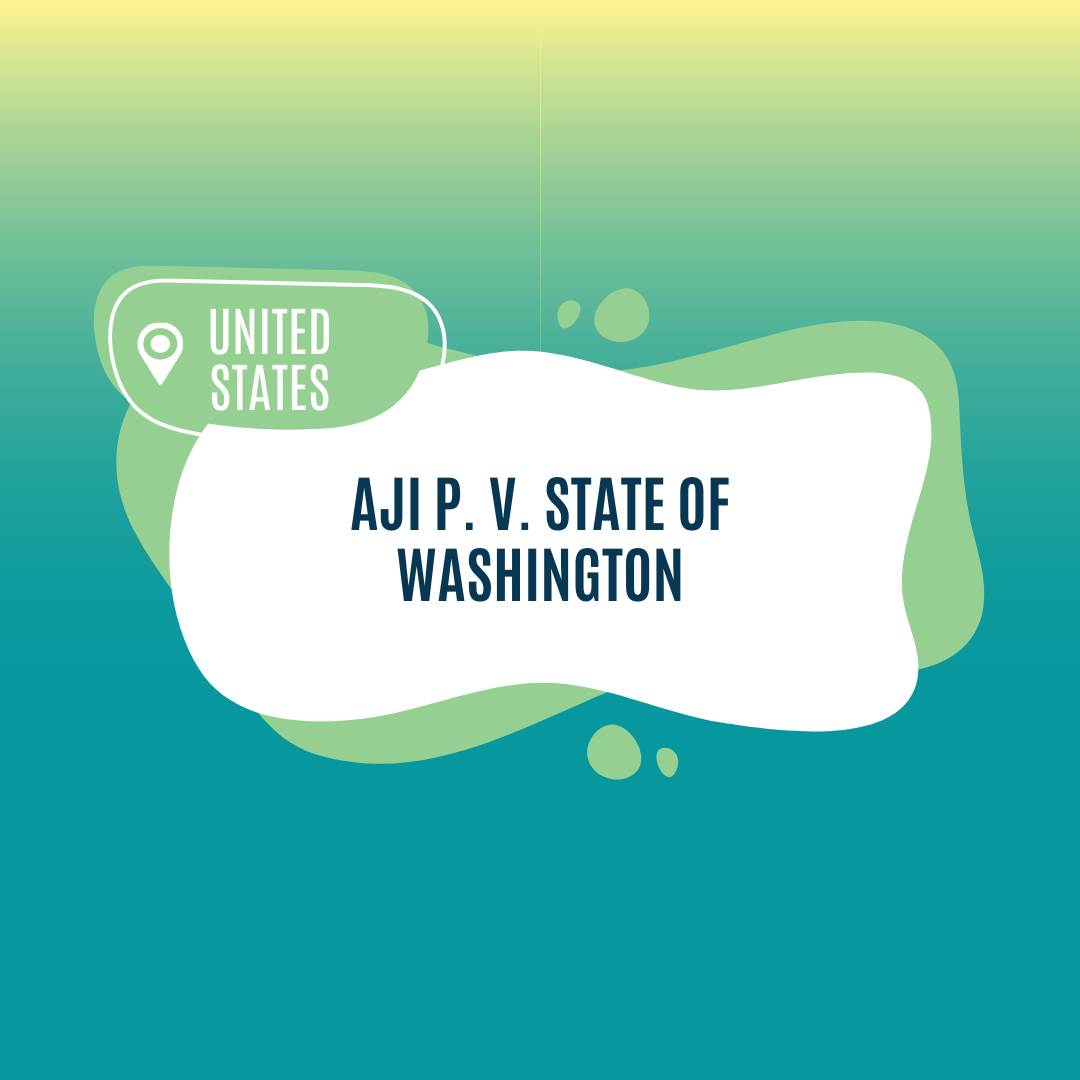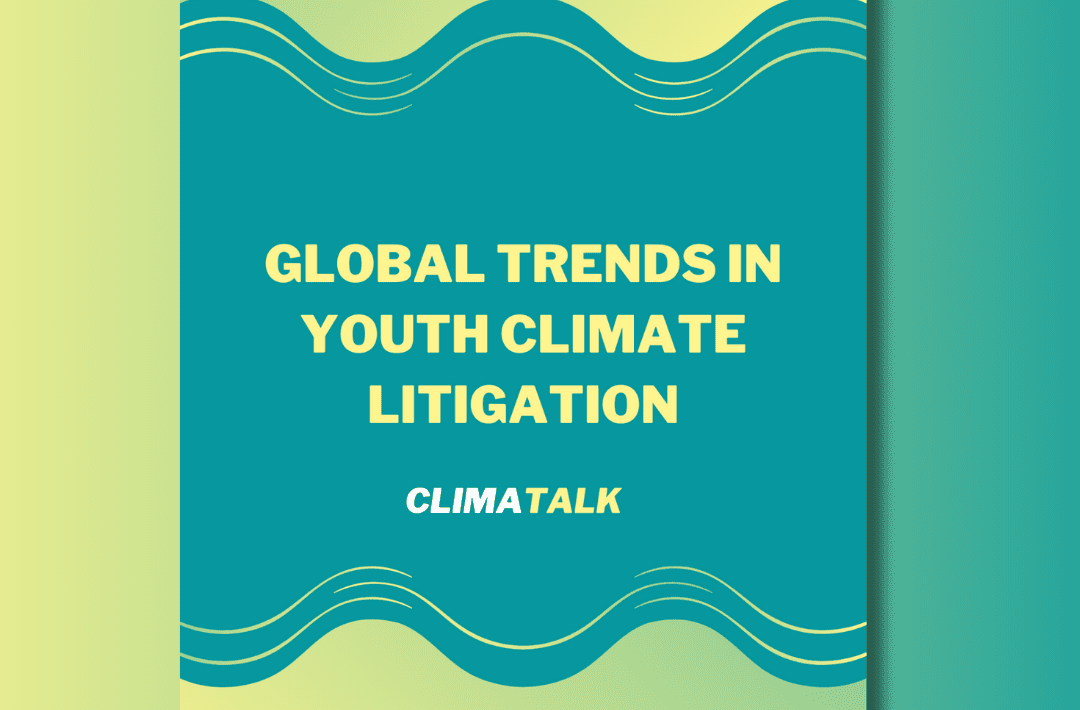
Aji P. v. State of Washington
by Leon Qiu
In Aji P. v. State of Washington, the youth petitioners argued in a judicial review claim that the fundamental human right to a healthful and pleasant environment was not upheld by Washington’s use of fossil-fuel-based energy and transportation systems. Greenhouse gases emitted from these systems thereby failed to mitigate against climate change. This petition, which eventually reached the Supreme Court of Washington, was ultimately denied.
| Country | United States |
| Defendants | State of Washington |
| Law applied | Domestic Environmental Law Constitutional Law |
| Key words | Mitigation Human Rights Energy Natural Resource Extraction |
Case Information
Court(s): King County Superior Court, Washington Court of Appeal, Supreme Court of Washington
Dissenting Judgement: Yes
Filing Date: 2018
Last Update: 2021
Status: Decided
ISSUES
The Washington State Supreme Court (the ‘Supreme Court’) was asked to decide whether or not to grant the Plaintiffs’ petition for judicial review of the state’s environmental policies on the basis that they violated their alleged fundamental right to a stable climate system.
MATERIAL FACTS/BACKGROUND
The youth petitioners (hereafter the ‘Plaintiffs’) brought a constitutional complaint against the State of Washington in King County Superior Court (‘the Superior Court’) on February 16, 2018, alleging that the state, the state agencies, and the officials (hereafter the ‘Defendants’) infringed on the Plaintiffs’ fundamental right to a stable climate system.[1] Attorneys for the Defendants moved to dismiss the case and this motion was granted on August 14, 2018.[2]
In response, the Plaintiffs’ attorneys filed a notice of appeal with the Washington Court of Appeals (‘the Appeal Court’) but the motion to dismiss was upheld.[3] On March 10, 2021, the Plaintiffs filed a petition for review with the Supreme Court.[4]
THE ARGUMENTS OF THE PARTIES
The Plaintiffs’ Arguments (in the Superior Court, the Appeal Court and the Supreme Court):
The Plaintiffs argued that they have the constitutional right to a stable climate system that sustains human life and liberty. According to the Plaintiffs, the state’s maintenance of a fossil-fuel-based energy and transportation system, which is known to result in greenhouse gas (GHG) emissions, infringed their ‘fundamental right to a healthful and pleasant environment’.[5]
The Plaintiffs also claimed that GHGs hasten a rise in the Earth’s temperature, which foreshadows the potential collapse of our environment. More specifically, they argued that the rise in the Earth’s temperature leads to an unstable climate system, thereby rendering the Earth conceivably unable to sustain human life and ensure continued enjoyment of liberty as protected by constitutional law.[6]
The Defendant’s Arguments (in the Superior Court, the Appeal Court and the Supreme Court):
The Defendants alleged that the Plaintiffs’ arguments are not justiciable. As such, there is no legitimate remedy to provide; the requested relief falls within the political question doctrine.[7] Therefore, they claim that a ‘political question’ must be dealt with by the executive branch of the government, not the judiciary.
THE JUDGEMENT
The Supreme Court ordered that the petition for review be denied; no reasons were provided. Nevertheless, Chief Justice Steven Charles González dissented.[8]
While the Appeal Court concluded that the petitioners’ claims were not justiciable because there was no remedy the court could provide, CJ González argued that whether climate change impacts are harms that are remediable under Washington’s laws and constitution is, in itself, a debatable issue.[9] The Supreme Court should therefore hear and decide on the matter, because ‘[a] declaration of rights from this court is meaningful relief, even if it is not a magic wand that will eliminate climate change’.[10] Furthermore, he noted that the Appeal Court had erred in ‘unnecessarily expand[ing] the political question doctrine’.[11]
Please find the Supreme Court judgement here and the Court of Appeals judgement here.
Last edited on 15 June 2023, with thanks to the case editor Charlie Bevis.
REFERENCES:
[1] Aji P v State, 198 Wash. 2d 1025, 497 P.3d 350 (2021) 2, available here.
[2] Sabin Center for Climate Change Law, ‘Aji P. v. State of Washington’ (Climate Change Litigation Databases) <http://climatecasechart.com/case/aji-p-v-state-washington/> accessed 4 June 2023.
[3] Aji P by & through Piper v State 16 Wn. App. 2d 177, 480 P.3d 438 17.
[4] Aji P (n 1).
[5] Aji P (n 1) 2.
[6] ibid.
[7] Aji P (n 3) 17.
[8] Aji P (n 1) 2.
[9] Aji P (n 1) 4.
[10] Aji P (n 1) 5.
[11] Aji P (n 1) 4.



